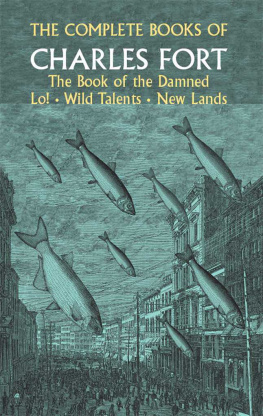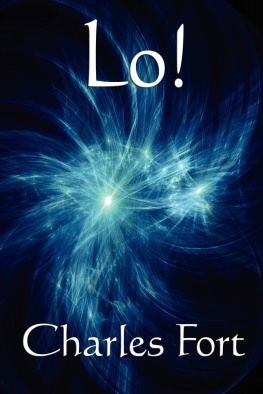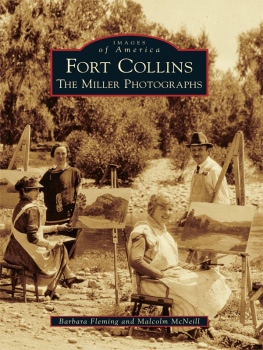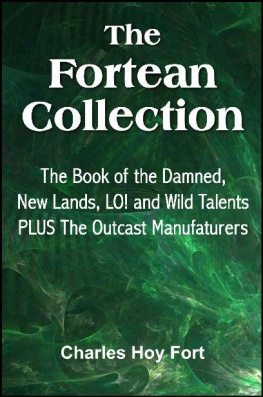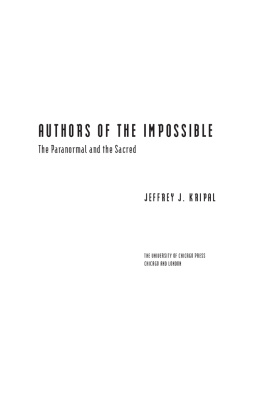The Complete Books of Charles Fort
The Complete Books of Charles Fort

THE BOOK OF THE DAMNED / NEW LANDS / LO! / WILD TALENTS
With a new Introduction by
DAMON KNIGHT
Founder and first President of Science Fiction Writers of America, author of Charles Fort, Prophet of the Unexplained
DOVER PUBLICATIONS, INC.
NEW YORK
Copyright 1974 by Dover Publications, Inc.
All rights reserved.
This Dover edition, first published in 1974, is a republication of the omnibus volume originally published for the Fortean Society by Henry Holt and Company, New York, in 1941. The four books by Fort are unabridged and unaltered, but the 1941 Introduction by Tiffany Thayer has been omitted. A new Introduction has been written specially for the present edition by Damon Knight. The publisher is grateful to Holt, Rinehart and Winston, Inc., for permission to reproduce the Index originally prepared for the 1941 omnibus volume.
The individual books by Fort were originally published as follows: The Book of the Damned, Boni and Liveright. Inc., New York, 1919; New Lands, Boni and Liveright, Inc., New York, 1923; Lo!, Claude H. Kendall, New York, 1931; Wild Talents, Claude H. Kendall, New York, 1932.
The present edition has had the encouragement and cooperation of the International Fortean Society (Info), P.O. Box 367. Arlington, Virginia 22210.
International Standard Book Number: 0-486-23094-5
Library of Congress Catalog Card Number: 74-79217
Manufactured in the United States by Courier Corporation
23094511
www.doverpublications.com

BIOGRAPHICAL NOTE
Charles Fort was born in Albany, New York, August 6, 1874, and died in the Bronx, May 3, 1932. He spent most of his life in New York City, but lived in London for several years in the twenties. His published works include The Books of Charles Fort and a novel, The Outcast Manufacturers.



Letter from Charles Fort to Kenneth Roberts, the novelist.

INTRODUCTION
TO THE DOVER EDITION
Charles Fort, eighteen years old, slammed his fathers stained-glass front door hard enough to break it. Shortly thereafter he left home and spent a year newspapering, then traveled around the world on about eighty cents a day. He married a woman who, according to one account, had been a cook in his grandfathers house, and they settled down in New York to twenty years of poverty. Then, at forty-two, Charles Fort came into a modest inheritance, and he and his wife lived happily ever after.
What charms me about this story, remembering all the cautionary tales about people spoiled by money, is the fact that the inheritance transformed Forts life for the better. He was able to drop the journalism and fiction that no one especially wanted, and do exactly what he wanted to do. What he wanted was to write the books you hold in your hand.
Some discoveries can be made only by the exercise of inhuman patience. The Curies refined radium. Jane Goodall watched chimpanzees. Charles Fort sat at a table in the New York Public Library or the British Museum every working day for twenty-seven years, reading and rereading the back files of every available scientific journal, popular science magazine and newspaper. When he found something out of the ordinary and not conventionally explainable, he made a note of it. Eventually he had thousands of these notes, written on little slips of paper, filed in shoeboxes.
He found that sober and experienced observers, again and again, had reported falls of blood, of fish, of frogs ; had seen unknown bodies in the heavens and unknown objects flying overhead. Long before they were called UFOs, Fort listed sightings of oddities in the sky from as far back as 1779. Some of these things had been seen by hundreds of people, for example the unknown airship that flew back and forth over Britain in 1913. It appeared for three weeks over England and Wales. Fort said: Possibly an airship from Germany could appear over such a city as Hull, upon the east coast of England, without being seen to arrive or to depart, but so far from Germany is Portsmouth, for instance, that one does feel that something else will have to be thought of. The appearances over Liverpool and over towns in Wales might be attributed to German airships by someone who has not seen a map since he left school. The airship had a searchlight that swept the ground. Newspaper pundits said it was the planet Venus.
Fort was at his best when he began to examine why and on what grounds these data had been excluded. Take, for example, the fishmonger explanation of a fall of periwinkles and crabs:
Upon May 28, 1881, near the city of Worcester, England, a fishmonger, with a procession of carts, loaded with several kinds of crabs and periwinkles, and with a dozen energetic assistants, appeared at a time when nobody on a busy road was looking. The fishmonger and his assistants grabbed sacks of periwinkles, and ran in a frenzy, slinging the things into fields on both sides of the road.... The details are mine, but I have put them in, strictly in accordance with the circumstances. There was, upon May 28, 1881, an occurrence near Worcester, and the conventional explanation was that a fishmonger did it. Inasmuch as he did it unobserved, if he did it, and inasmuch as he did it with tons upon acres, if he did it, he did it as I have described, if he did it.
He noted that at one time only superstitious persons believed that stones could fall from the sky: therefore when a supposed meteorite was found, it had been there in the first place. Now, when strange things are seen or heard in the sky, they are only meteors.
In a letter to Theodore Dreiser (October 29, 1916) Fort replied to Waldemar Kaempfferts charges that he was a Christian Scientist and a Berkeleyite. He did not believe with Berkeley, Fort said, that all things exist only in the beholders consciousness ; he believed that all things, including beholders, are figments of a super-consciousness. As for inconsistency, another charge of Kaempfferts, Fort said, In X, I have pointed out that, though theres nothing wrong with me personally, I am a delusion in super-imagination, and inconsistency must therefore be expected from mebut if Im so rational as to be aware of my irrationality ? Why, then I have glimmers of the awakening and awareness of super-imagination.
In 1931, when Tiffany Thayer and Aaron Sussman founded the Fortean Society, Fort had to be tricked by mendacious telegrams into attending the celebratory banquet. He said he would not join the organization himself, any more than Id be an Elk.
Thayer, an ambitious and energetic man, genuinely liked Fort and believed in him; he also tremendously enjoyed making trouble and irritating people. Under his direction (and paid for largely by him) the Fortean Society magazine Doubt was a curious mixture of pseudoscholarship and deliberate outrageous-ness. In his introduction to the original edition of this book, he pictures Fort as a medieval swordsman born out of his time (it often occurred to me that his frame called for leather and buckles), but this was typical hyperbole, probably influenced by the fact that Thayer himself was short and slender. Fort, in fact, was built more like a walrus than like a warrior ; he was an utterly peace-able and sedentary man. He lived quietly with his wife, almost never went out or had visitors, had no telephone. His only friends, except for a few apartment-house neighbors, were Dreiser and Thayer. He spent his mornings working at home, afternoons in the library ; he and his wife went to the movies nearly every night.
Next page
